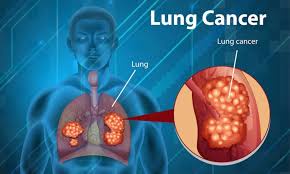Introduction: The Promise of Targeted Therapy in Advanced Cancer Treatment
Stage 4 lung cancer and breast cancer represent formidable adversaries in the realm of oncology. However, a beacon of hope has emerged in the form of targeted therapy, revolutionizing the treatment landscape for these advanced cancers. In this article, we delve into the groundbreaking world of targeted therapy and its impact on stage 4 lung cancer and breast cancer.
Understanding Stage 4 Lung Cancer: A Complex Challenge
Stage 4 lung cancer, also known as advanced or metastatic lung cancer, is characterized by cancer cells that have spread to other parts of the body. It is often diagnosed at an advanced stage, which makes it challenging to treat. Conventional treatments, such as surgery and radiation, may have limited effectiveness in such cases.
Targeted Therapy for Stage 4 Lung Cancer: Precision Medicine at Its Best
Targeted therapy is a game-changing approach in the treatment of stage 4 lung cancer. Unlike traditional chemotherapy, which attacks all rapidly dividing cells, targeted therapy focuses on specific molecular alterations present in cancer cells. Key aspects of targeted therapy for stage 4 lung cancer treatment include:
-
EGFR Inhibitors: Targeting the epidermal growth factor receptor (EGFR) has shown tremendous success in the treatment of non-small cell lung cancer (NSCLC). Drugs like erlotinib (Tarceva) and osimertinib (Tagrisso) specifically target EGFR mutations.
-
ALK Inhibitors: Anaplastic lymphoma kinase (ALK) inhibitors, such as crizotinib (Xalkori) and alectinib (Alecensa), are used to treat NSCLC with ALK rearrangements.
-
Immunotherapy Combinations: Combining targeted therapy with immunotherapy has proven effective in some cases. Immunotherapy helps the immune system recognize and attack cancer cells, while targeted therapy hinders the growth of these cells.
-
ROS1 Inhibitors: For NSCLC patients with ROS1 rearrangements, drugs like crizotinib and entrectinib (Rozlytrek) target this genetic alteration.
Breast Cancer: A Multifaceted Disease
Breast cancer is one of the most prevalent cancers among women worldwide. It is not a uniform disease but comprises various subtypes, each with its unique characteristics and treatment considerations. The two primary subtypes are:
-
Hormone Receptor-Positive Breast Cancer: This subtype is characterized by the presence of hormone receptors, specifically estrogen and progesterone receptors, on the surface of cancer cells.
-
HER2-Positive Breast Cancer: Human epidermal growth factor receptor 2 (HER2) is overexpressed in this subtype, making it an ideal target for treatment.
Targeted Therapy for Breast Cancer: A Tailored Approach
Targeted therapy for breast cancer has revolutionized the management of breast cancer, offering more precise and effective treatment options. The primary targeted therapies for breast cancer include:
-
Hormone Therapy: Hormone receptor-positive breast cancer is often treated with hormone therapy, which blocks the hormones that fuel the growth of cancer cells. Tamoxifen and aromatase inhibitors are commonly used drugs.
-
HER2-Targeted Therapy: HER2-positive breast cancer is treated with drugs that specifically target the overactive HER2 protein. Trastuzumab (Herceptin), pertuzumab (Perjeta), and ado-trastuzumab emtansine (Kadcyla) are examples of HER2-targeted therapies.
-
PARP Inhibitors: PARP inhibitors, like olaparib (Lynparza) and talazoparib (Talzenna), are used for breast cancer patients with BRCA gene mutations, which make the cancer cells more susceptible to this treatment.
-
CDK4/6 Inhibitors: These drugs, such as palbociclib (Ibrance) and ribociclib (Kisqali), are used in combination with hormone therapy for hormone receptor-positive breast cancer.
The Impact of Targeted Therapy: Personalized Cancer Care
The transformative power of targeted therapy lies in its ability to provide personalized cancer care. By identifying the specific genetic and molecular alterations driving a patient's cancer, treatment can be tailored to precisely target these vulnerabilities. This not only enhances the effectiveness of treatment but also minimizes the side effects associated with traditional chemotherapy.
Challenges and Future Directions
Despite the remarkable progress achieved with targeted therapy, challenges remain. Resistance to targeted therapies can develop over time, requiring ongoing research to develop new treatment strategies and overcome resistance mechanisms.
Additionally, the cost and accessibility of targeted therapies are concerns that need to be addressed to ensure that all eligible patients can benefit from these advancements.
Conclusion: A New Dawn in Cancer Treatment
Targeted therapy has ushered in a new era in the treatment of stage 4 lung cancer and breast cancer. With its precise focus on the genetic and molecular underpinnings of these cancers, targeted therapy offers new hope and improved outcomes for patients facing advanced disease. The future of cancer care is personalized, promising, and filled with the potential for even greater advancements in the fight against these formidable cancers.


No comments yet